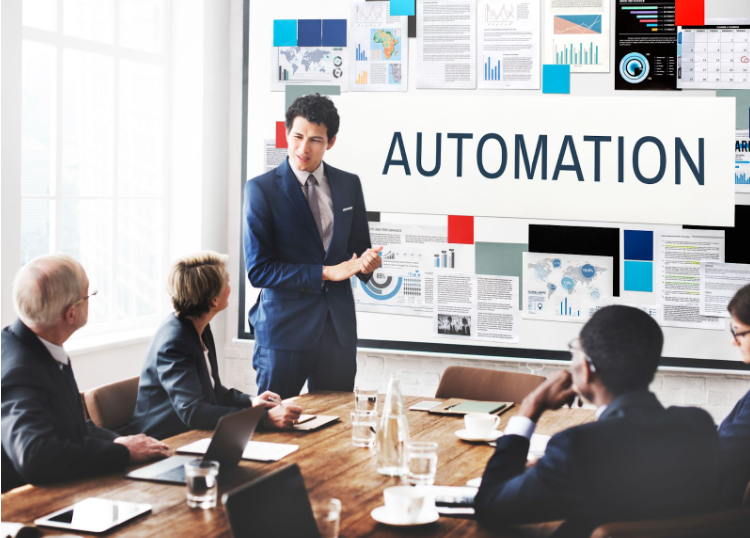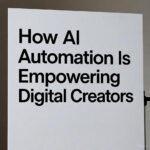To survive in the world that moves quickly today, companies have to work more efficiently, deliver faster results, and commit fewer mistakes. The way to achieve all of this is by using the right technology. AI automation and intelligent process automation are two such technologies that are radically changing the way business is done. These two technologies combined can change the whole business landscape; thus, the processes are getting facilitated, sped up, and made more accurate.
What is AI Automation?
AI automation is used in the sense of using artificial intelligence to undertake tasks that would otherwise require human intelligence. Tasks included can be reading documents, answering customer questions, analysing data, or making decisions. AI differs from common software in that it can learn from data, identify patterns, and become more intelligent with time. This means that businesses can rely on AI to execute tasks that are often repetitive, time-consuming, or prone to errors.
For example, imagine a company that has hundreds of emails from customers each day. Instead of workers reading and answering every email, AI automation can read the emails, understand the customer request, and even send out responses. It saves time and mistakes and enables human labour to focus on valuable work.
What is Intelligent Process Automation?
While AI automation is focused on using AI for automating discrete tasks, Intelligent Process Automation (IPA) looks at the bigger picture. IPA combines AI, machine learning, and conventional automation tools to manage end-to-end business processes. A business process refers to a series of steps that need to be undertaken to realise an objective. Processing a customer order, for example, involves checking inventory, billing, shipping, and record updating.
Intelligent Process Automation can do all of this on its own. It will be able to detect bottlenecks, predict delays, and even suggest improvements. In simple language, IPA does not just do things but also thinks about doing things in the best manner possible.
How AI Automation Powers Intelligent Process Automation
AI automation is the heart and soul of intelligent process automation. Without AI, automation can do only as per predefined rules. It cannot adapt to changes, uncertainties, or complex tasks. AI infuses intelligence into automation. It can make decisions, learn from experience, and modify behaviour to accommodate fresh situations.
As an example, consider an invoice-processing firm. Traditional automation can simply copy data from one system to another. AI automation, however, can read invoices in different formats, understand the data, and detect errors. With IPA, it can automate the entire process of invoice processing from receiving the invoice to payment approval without human intervention. It cuts down on errors, speeds up work, and is cost-effective.
Benefits of AI Automation and Intelligent Process Automation
1. Faster Operations:
AI automation allows us to perform work within seconds that would have otherwise consumed hours or even days. With IPA, entire workflows become faster. Businesses are able to serve customers faster and respond to changes in the market in the blink of an eye.
2. Minimised Errors;
Humans do make mistakes, especially when performing the same task. AI automation reduces such errors by performing tasks in the same manner and without mistakes. Intelligent Process Automation detects errors early in the process to prevent bigger problems later.
3. Cost Savings:
By reducing labour and errors, businesses save. Employees will focus on creative, high-value work instead of spending time on drudgery. This will increase efficiency in operations and allow the business to expand without extra cost.
4. Enhanced Customer Experience:
Quicker and more accurate operations mean better-served customers. Orders are fulfilled quickly, invoices are correct, and inquiries are responded to promptly. AI automation and IPA together deliver a smooth and reliable customer experience.
5. Continual Improvement:
Data is trained on AI. Over time, it executes tasks with greater accuracy. Intelligent Process Automation uses such learning to improve business processes overall. This means that the business is continually getting better without any extra work from employees.
Examples from the Real World
Banking: Banks handle thousands of transactions, applications, and customer queries daily. AI automation is capable of automating application error checks, fraud detection, and customer queries. Intelligent Process Automation can automate the whole process from application to approval, making banking faster, safer, and more reliable.
Healthcare: There are several processes within hospitals, e.g., patient registration, billing, and reporting lab work. AI automation can scan patient forms and lab reports, detect issues, and notify staff. IPA can automate the entire process so that patients can be treated within time and records updated in the right way.
Retail: Retailers process orders, inventory, and customer support. AI automation can manage inventory, predict stock shortages, and respond to customer questions. IPA can automate the end-to-end supply chain from order to delivery to make shopping seamless and reliable.
How to Start to Implement AI Automation and IPA
- Identify Routine Tasks – Start by looking at tasks that use a lot of time or are prone to errors. These are the best fit for automation.
- Choose the Right Tools – There are many IPA and AI tools. Choose those that suit your business needs and fit with your existing systems.
- Begin Small – Begin small. Test, learn, and optimise. Once successful, roll it out across the whole business.
- Monitor and Optimise – AI Automation and IPA are not “set and forget.” Constantly review performance and optimise workflows.
- Train Staff – Staff should be aware of how AI and IPA function. Train them to work with these tools, maximising the application of the technology.
Misconceptions
A few are worried that AI automation and intelligent process automation will automate individuals out of their jobs. The fact is different. Both these technologies do routine and mundane work so that the employees can do creative, strategic, and people-oriented work. Firms that successfully deploy AI and IPA, in most cases, see higher employee satisfaction, not lower.
A second myth is that automation is too expensive or complex. Certain projects can be large, but most businesses are started small and build upon a growing enterprise. New AI solutions are designed to be simple to use and expandable for any-sized company.
The Future of Business with AI Automation and IPA
The Future is with the companies that will use AI automation and intelligent process automation. To these firms will belong the advantages of doing the same work faster, making fewer mistakes, and treating customers better. AI keeps getting smarter, processes become more intelligent, and organisations keep getting better as time goes on.
Pretty soon, companies will not only automate processes but also anticipate problems before they occur, recommend better solutions, and make decisions based on real-time data. It is not a matter of the future; it is already going on in many companies.
Conclusion
AI Automation and Intelligent Process Automation (IPA) are the major revolutions in the business world and thus cannot be considered as an option anymore. Instead, they are a necessity to survive the business competition these days. AI Automation is a technology that makes tasks smarter, while IPA is a tool that makes an entire organisation operate seamlessly and effectively. When they are implemented together, they can save time, make the work more accurate, reduce costs, and improve the customer experience.
Companies implementing these technologies today will not only be the ones leading the way tomorrow, but they will also become more intelligent and productive regardless of their size. Employees will be given the freedom from doing monotonous tasks, customers will get better service, and companies will be in a better position to widen their scope and adjust to the ever-changing environment. What embracing AI automation and intelligent process automation means is not merely about adapting technology but rather reinventing the way business is conducted in a more intelligent, faster, and reliable manner.






